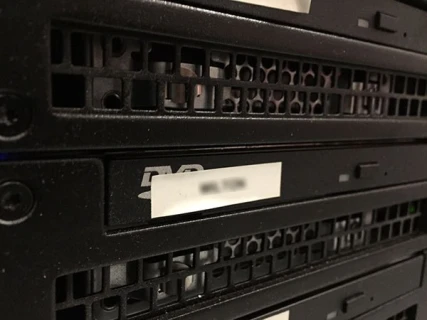How we manage our domains and hosting
—I recently spotted a question on Twitter from a fellow EE/Craft developer asking who people use for domain registration. This got me thinking it might be of interest to others how we manage our clients domains and hosting.
Domain Registrations
We tend to register new domain names with Heart Internet. To be honest, this is something of a hangover from the days when we used their hosting reseller package - it just made sense to keep domains and hosting accounts together, but we don't really have any complaints with the service or features.
Over the years though, we've also got some domains registered with Fasthosts and 123-Reg. We've found Heart to have a good balance of features with a friendly control panel and pricing, but in more recent years, the choice has sometimes come down to the availability of some of the newer domain extensions.
Fasthosts also allows us to set ‘glue’ records in their DNS management so we can use our own custom nameservers. Technically we don't need to use our own nameservers, but I do think it gives us added professionalism to support our brand with our DNS host.
Domains are always registered to our clients. This should be a given, but we deal with inaccurate domain registrations all the time. If you think about it, you wouldn't buy a car and leave it registered to the garage that sold it. Yet domain names, one of the most valuable assets a business can have is frequently overlooked.
DNS
As we've alluded to above, we don't tend to use the DNS services of domain registrars. There are some exceptions, but for most of the domains we hold and manage, our custom nameservers route through to Point DNS.
DNS is obviously a critical part of the puzzle in providing reliable uptime for clients - it's not just about having reliable hosting servers. Over the 5 years or so with Point, we've seen just 2 DNS outages caused by DDoS attacks. It's 2 too many really, but the impact has been low so we’ve no plans to migrate elsewhere for now. We could use the DNS provided by domain registrars, but having independent DNS gives us an extra layer of flexibility should there be problems with either domain or DNS hosts.
Point also allows you to create DNS templates which are useful for the different environments we deploy sites to and there's an API, although we've not used this. There's also a 1-click setup for google apps which saves having to create a plethora of individual records.
Servers
We've currently got 2 dedicated servers with Melbourne in Manchester. To be honest, these are approaching replacement but they've been reliable workhorses with exceptional uptime over the last 4 years.
We place enormous value on our hosting arrangements - I've always said that cheap hosting is expensive hosting and if you buy cheap, you buy twice. As a small team, the last thing we want to have is our time (or reputation) threatened by server failures or outages, so we pay for a fully managed service with Melbourne. Of course this is more expensive, but it's also peace of mind for us and our clients. As a result, we also have a great relationship with Melbourne and their 24/7 support team - they know us by name (and not because we're always on the phone to them), react to our tickets promptly and this week even visited us to help us migrate our dedicated servers to new generation cloud hosting. We've also had the privilege of seeing our actual servers in the datacentre, so we know and can control every aspect of the hosting we offer.
When it comes to hosting, cheap hosting is expensive hosting.
Andrew Armitage
Our servers both run CentOS and use a LAMP stack with Plesk control panels. We're reasonably comfortable working in the command line, but Plesk is a convenience for day to day tasks that everyone in our team can manage.
Both servers are sat behind a configurable firewall and we have twice daily backups to an offsite data centre. We also have monitoring in place with Melbourne, but have chosen to run our own Pingdom checks on both servers, with our uptime reports publicly available.
Need help with your digital strategy?
Get in touch — we'd love to hear about your project.

One of our servers in Melbourne's datacentre.
We'll be upgrading our hosting offer over the next few months, but we'll continue working with Melbourne to ensure our clients can totally depend on us to keep their services online, secure and performing efficiently.
We also use some third party storage such as Amazon S3 depending on the requirements of the site.
Reseller Hosting
I mentioned above that we'd historically used a reseller hosting package from Heart Internet. We actually still have this for some older sites. I'd love to close this, but it's still economical for us to continue it for legacy sites, some of which are still running older versions of php.
Heart’s reseller package is ok, so long as the sites aren't business critical or receive low traffic. Uptime has generally been good, but there have been times where downtime has persisted over several days. We've found support to be generally good, but then again, with non-critical sites hosted here, we've never been jumping around panicking about lost business.
Alternative Options
So there we are. We know there are lots of alternatives with others like DigitalOcean, Cloudflare, Route53, and we keep an eye on these as they develop and introduce new services. However, the arrangements we have in place work really well for us and we’ve full confidence in the infrastructure and partners we’re working with.
There are exceptions where hosting requirements might need something more comprehensive. We look at specific solutions for these cases, taking advantage of specialist advice in our network on the best architecture for the demands of the site or client.

